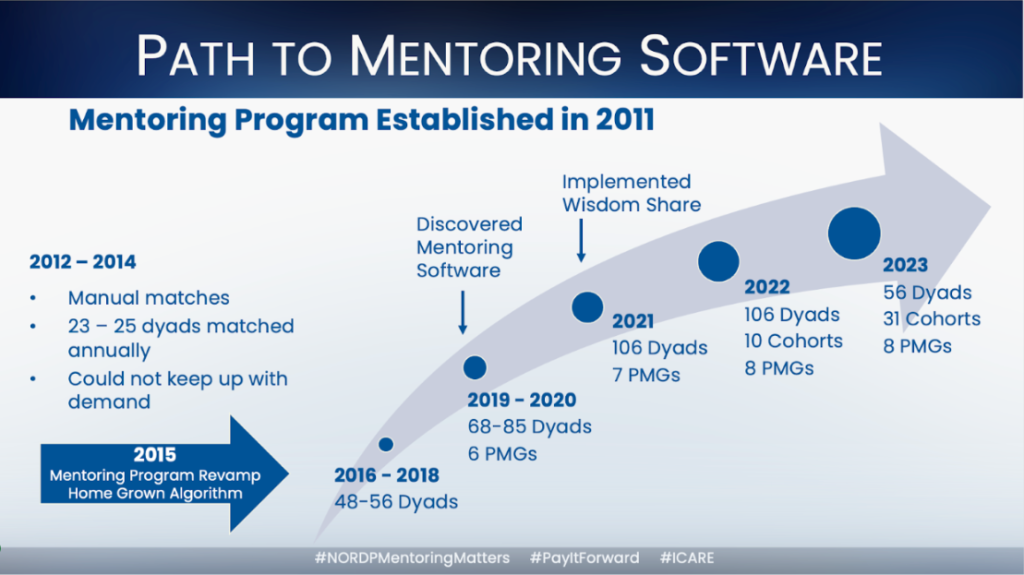Contributors: Proposal Development Peer Mentoring Groups (PMG) Co-conveners — Sonya Craig, New York University, Grossman School of Medicine and Lindsay Ridpath, University of Arizona
The Proposal Development field is growing as proposals become more complex and as the competitiveness for obtaining research funding continues. Academic success is not achievable through the efforts of a solitary individual; the era of lone geniuses thriving in academia has passed, emphasizing the collaborative nature of contemporary academics that thrives on teamwork, be that with other investigators or with research development (RD) professionals.
To help RD professionals build a network of support, NORDP initiated the peer mentoring groups (PMGs) in 2019, out of what was then the Community of Practice Groups. As David Widmer stated for an earlier blog post about the PMGs: “We are never fully developed by a single mentor. If you think about your broader network, it’s clear that you are being mentored by multiple people.” Jan Abramson said PMGs developed “from a discussion about member needs, the importance of building a network of mentors, and making sure anyone who requests a mentor has one.” A driving factor in PMGs is NORDP members’ needs. Christina Howard, David Widmer, Jan Abramson, Kathy Partlow, Faye Farmer, Katie Shoaf, and other members of NORDP’s Mentoring Committee, are the brains behind the PMGs, orchestrating the programming that has proven to be a valuable resource for many. The Proposal Development PMG is one of six active groups.
Proposal development can be summarized as the process of advising, writing, editing, coordinating, and compiling grant applications. The RD specialist can have many roles within proposal development, including as an educator, a project manager, a writer/editor/illustrator, or an advisor and advocate. Many proposal development professionals give guidance on and coordinate writing of grant components (including budgets, letters of support, and research strategies), manage grants libraries and other institutional resources, and coordinate and manage peer or “Red Team” reviews.
The proposal/research development role has evolved over the last decade, leading to major growth in proposal development specialists in university settings. Now, innovations in generative Artificial Intelligence and graphic design have the potential to transform both proposal development and proposal evaluation, meaning that the roles of RD professionals are likely to change in the near future. Likewise, complex proposals and transformational initiatives, like ARPA-H, are transitioning grant writing from a solo experience to one requiring strategic planning from a group. Industry support in research is also increasing, as more government agencies are including industry participation in their proposals. Some examples of this are the National Science Foundation’s (NSF) Innovation Engines (NSF Engines) and Directorate for Technology, Innovation, and Partnerships (TIP) programs, and the US Economic Development Association’s (EDA) Regional Technology and Innovation Hubs (Tech Hubs). Companies like Amazon are increasingly offering research awards (Amazon Research Awards) to test solutions. Industry understands the value academic research brings and is increasingly interested in research collaborations rather than developing an internal R&D arm.
By connecting with colleagues at other universities through our Proposal Development PMG, members are able to stay abreast of how other institutions are negotiating these new developments as they arise. Our PMG has active members from all over the US, in the medical, engineering, social science, and humanities fields. Some members are in leadership roles within their institutions working in large RD offices, while on the other extreme, we have colleagues who are independent consultants who work from home. We both joined the PMG for different reasons: Sonya was working within an academic unit as the sole grant writer and wanted to grow her RD professional network; whereas Lindsay joined the PMG as a Foundation Relations professional with the goal of cultivating connections and gaining a comprehensive understanding of the research enterprise. Whatever your office size or job classification, if you have an interest in discussing proposal development best practices and challenges, we invite you to join us for an informal conversation the first Tuesday of every month at 1 pm ET. See this site within WisdomShare for more information, or direct any questions by emailing the Mentoring Committee at mentorprogram@nordp.org.



